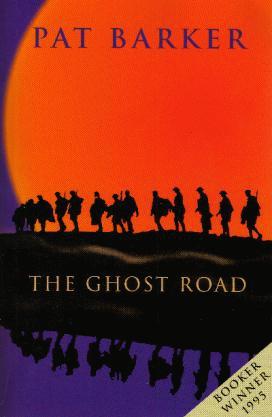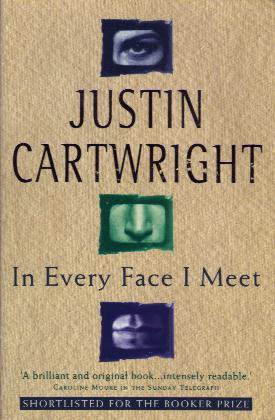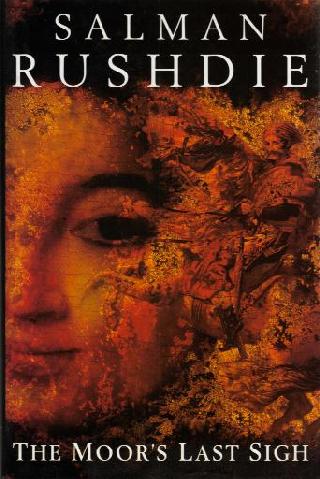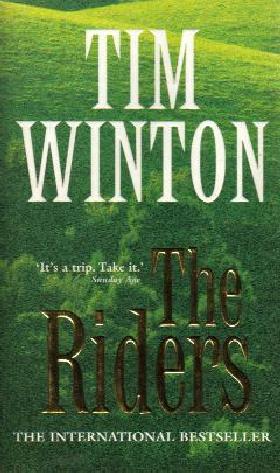
Pat Barker
The following novels constitute the shortlist for the 1995 Booker Prize:
Notable Omissions from the 1995 Shortlist
The judges of the 1995 prize were: George Walden MP (Chair), Kate Kellaway, Peter Kemp, Adam Mars-Jones, and Ruth Rendell.

|
The Ghost Road Pat Barker |
First Paragraph:
In deck-chairs all along the front the bald pink knees of Bradford businessmen nuzzled the sun.
Billy Prior leant on the sea-wall. Ten or twelve feet below him a family was gathering its things together for the trek back to boarding-house or railway station. A fat, middle-aged woman, swollen feet bulging over laced-up shoes, a man with a lobster-coloured tonsure - my God, he'd be regretting it tomorrow - and a small child, a boy, being towelled dry by a young woman. His little tassel wobbled as he stood, square-mouthed with pain, howling, 'Ma-a-am.' Wet sand was the problem. It always was, Prior remembered, However carefully you tiptoed back from that final paddle your legs got coated all over again, and the towel always hurts.
The child wriggled and his mother slapped him hard, leaving red prints on his chubby buttocks. He stopped screaming, gulped with shock, then settled down to a persistent grizzle. The older woman protested. 'Hey, our Louie, there's no need for that.' She grabbed the towel. 'C'mon, give it here, you've no bloody patience, you.'
From the Viking paperback edition, 1995.

|
In Every Face I Meet Justin Cartwright |
Dustjacket synopsis:
"Set against the background of Nelson Mandela's release, IN EVERY FACE I MEET is the story of
Anthony Northleach, and one intense, comic and horrifying day in his life."
Quotes:
"A brilliant and original book...There can be nothing derivative about a novelist with Justin
Cartwright's fresh accuracy of perception, which provides constant small shocks of recognition...funny
as well as bleak, and full of humanity. This is a novel that tackles the big
state-of-the-modern-world themes; it is also intensely readable." - Caroline Moore, Sunday Telegraph
"A striking piece of work - sharp, satirical and, in the end, unexpectedly compassionate." -
D.J. Taylor, The Sunday Times
"Glitteringly entertaining." - The Times
"An immensely intriguing novel, which binds all kinds of contemporary political, racial and
social nuances into a hugely readable, beautifully written, thoughtful book." - Marie Claire
First Paragraph:
The boom in mozzarella, trade or consumer led?
The freelance writer Julian Capper has failed to come down firmly on either side. He has concluded that the boom, the one-thousand-percent increase in consumption of mozzarella in the last five years, is a product both of promotion by the supermarkets and demand created by holidaymakers returning from package tours to Italy. The situation is complicated by the fact that pizza is becoming ever more popular, and some of the cheese used for pizza is not the authentic mozzarella, which is produced in Campania. Even in Italy, there is debate about real mozzarella, with the claims of regions like Salerno and Calabria discounted by some experts.
Still, it is clear that the supermarkets have promoted mozzarella successfully. British consumers are even trying the traditional buffalo mozzarella. This cheese is of an immaculate whiteness and is best accompanied by a glass of crisp, Italian white wine. That is what he has written. He has also ponted out that mozzarella has an affinity with tomatoes, basil and good olive oil. (He has written about olive oil two or three times in the past.)
From the Sceptre paperback edition, 1996.
Notes:
The title of the novel is taken from William Blake's poem "London", which begins:
I wander thro' each charter'd street
Near where the charter'd Thames does flow
And mark in every face I meet
Marks of weakness, marks of woe.

|
The Moor's Last Sigh Salman Rushdie |
Dustjacket synopsis:
"'Mine is the story of the fall from grace of a high-born crossbreed - me, Moraes Zogoiby, called
'Moor', for most of my life the only heir to the spice-trade-'n'-big-business millions of the da
Gama-Zogoiby dynasty of Cochin - and of my banishment by my mother Aurora, nee da Gama, most
illustrious of our modern artists.'
"It began with the watery disappearance of Great-Grandfather Francisco, swallowed by the bustling lagoon lapping his island mansion; and with the catastrophic family conflict that followed, an epic battle that led to torched cashew orchards, smouldering cardomon groves, and murders. Thus was a family divided, not just by greed and secrets, but by chalk lines drawn across floors, like frontiers, and spice-sacks piled up across courtyards, as though they were defences.
"(Years later, Bombay would also go up in flames, victim of its own fatal diversions.)
"Once a year, high above massed festival crowds, her white hair flying in long loose exclamations, her ankles a-jingle with silver bell-bracelets, Aurora would dance her rebellion against India's immense perversity. And, in magical charcoal and oils, she tried to heal what-could-not-be-kept-whole, laying bare, on gallery walls, the secrets of her family and times.
"From the Paradise of Aurora's legendary salon to his omnipotent father's sky-garden atop a towering glass high-rise built by invisible men, the Moor's breathless story unfolds his family's often grotesque but compulsively moving fortunes, and the tragi-comic transformations wrought by love.
"Surpassing even the imaginative brilliance of Midnight's Children, The Moor's Last Sigh is spectacularly ambitious, funny, satirical and compassionate. It is a love song to a vanishing world, but also its last hurrah."
First Paragraph:
I have lost count of the number of days that have passed since I fled the horrors of Vasco Miranda's mad fortress in the Andalusian mountain-village of Benegeli; ran from death under cover of darkness and left a message nailed to a door. And since then along my hungry, heat-hazed way there have been further bunches of scribbled sheets, swings of the hammer, sharp exclamations of two-inch nails. Long ago when I was green my beloved said to me in fondness, 'Oh, you Moor, you strange black man, always so full of theses, never a church door to nail them to.' (She, a self-professedly godly un-Christian Indian, joked about Luther's protest at Wittenburg to tease her determinedly ungodly Indian Christian lover: how stories travel, what mouths they end up!) Unfortunately, my mother overheard; and darted, quick as snakebite: 'So full, you mean, of faeces.' Yes, mother, you had the last word on that subject, too: as about everything.
From the Jonathan Cape hardback edition, 1995.
Notes:
This novel won the 1995 Whitbread Novel Award.

|
Morality Play Barry Unsworth |
Dustjacket synopsis:
"It is late in the fourteenth century, a time of calamity such as few others have been, marked
by war, plague and fear of hell-fire. Nicholas Barber, a footloose young cleric, has left
his diocese without his Bishop's leave. He has sung in taverns, he has gambled away his holy
relics, he has committed adultery. Now, to compound his sins, he has joined a troupe of
travelling players, a thing expressly forbidden to members of the clergy. Trouble enough, but
nothing compared to what happens when the company decides to enact the murder of the young boy
called Thomas Wells.
"His body was found by the roadside; a young woman is awaiting execution. For the people of the town it is a matter of absorbing interest and they throng to see the play. For the players it is a great chance to make money. But the more they try to act out the last moments of Thomas Wells, the more they become aware of discrepancies, things that don't add up, in the official version of events. Led on by the lure of money, trapped in their roles, they find themselves in a situation of appalling danger. As they play under the gallows the identity of the real murderer becomes horribly clear.
"Morality Play is Barry Unsworth's first novel since winning the Booker Prize. It is a dark and powerful fable about the masks we wear, the roles we play and the corrupted nature of justice."
First Paragraph:
It was a death that began it all and another death that led us on. The first was of the man called Brendan and I saw the moment of it. I saw them gather round and crouch over him in the bitter cold, then start back to give the soul passage. It was as if they played his death for me and this was a strange thing, as they did not know I watched, and I di not then know what they were.
Strange too that I should have been led to them, whether by angels or demons, at a time when my folly had brought me to such a great need. I will not hide my sins, or what is the worth of absolution? That very day hunger had brought me to adultery and through adultery I had lost my cloak.
From the Hamish Hamilton hardbackback edition, 1995.

|
The Riders Tim Winton |
Dustjacket synopsis:
"Fred Scully can't wait to see his wife and daughter. He's got a new life for them all
worked out.
"He's sweated on the reunion.
"The doors at the airport hiss open.
"Scully's life falls apart..."
Quotes:
"The Riders is a tremendous read. It is fierce about life. Tim Winton wants to
sweep you off your feet; let him." - The Spectator
"...he is not a great Australian novelist; he is a great novelist, full stop." -
The Times
"A haunting, sprawling, gut-wrenching tale from a prodigiously talented young novelist." -
Esquire
"...a hell of a novel...a hell of an important novel." - Australian Book Review
First Paragraph
With the north wind hard at his back, Scully stood in the doorway and sniffed. The cold breeze charged into the house, finding every recess and shadowy hollow. It rattled boards upstairs and lifted scabs of paint from the walls to come back full in his face smelling of mildew, turf, soot, birdshit, Worcestershire sauce and the sealed-up scent of the dead and forgotten. He scraped his muddy boots on the flagstones and closed the door behind him. The sudden noise caused an explosion in the chimney as jackdaws fled their fortress of twigs in the fireplace. His heart racing, he listened to them batter skyward, out into the failing day, and when they were gone he lit a match and set it amongst the debris. In a moment fire roared like a mob in the hearth and gave off a sudden, shifting light. The walls were green-streaked, the beams overhead swathed in webs and the floors swimming with trash, but he was comforted by the new sound and light in the place, something present besides his own breathing.
He simply stood there firestruck like the farmboy of his youth, watching the flames consume half-fossilized leaves and twigs and cones. There in the blaze he saw the huge burns of memory, the windrows of uprooted karris whose sparks went up like flares for days on end over the new cleared land. The walls here were a-dance now, and chunks of burning soot tumbled out onto the hearthstone. Scully jigged about, kicking them back, lightheaded with the stench and the thought of the new life coming to him.
The chimney shuddered, it sucked and heaved and the rubbish in the house began to steam. Scully ran outside and saw his new home spouting flame at the black afternoon sky, its chimney a torch above the sodden valley where his bellow of happiness rang halfway to the mountains. It really was his. Theirs.
From the Pan paperback edition, 1995.
You can read further details of this and other novels by Tim Winton on this webpage.
Notable Omissions from the Shortlist:
"Behind the Scenes at the Museum", Kate Atkinson (winner of the 1995 Whitbread First Novel Award and Whitbread Book of the Year)
"The Blue Flower", Penelope Fitzgerald
This page and its contents are copyright © 2002-05 by Perry Middlemiss, Melbourne, Victoria, Australia.
Last modified: October 24, 2005.